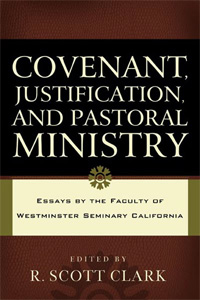The Law—considered as a national covenant, by which their continued possession of the land of Canaan, and of all their privileges under the Theocracy, was left to depend on their external obedience to it,— might be called a national Covenant of Works, . . . Continue reading →
Covenant Theology
Untangling Webs Of Assumptions About Baptism
Wendy writes, I remain confused as to why God in being ‘more generous’ has actually also made it ‘more ambiguous’. Wheras under the Old Covenant the command (and its benefits) were explicit, under the New they must be deduced by inference…. I . . . Continue reading →
What About Noah and Covenant Theology?
Taylor asks the question on the PB. My reply below: There are resources on covenant theology here. I would especially encourage you to read this collection of quotations from older writers on CT. There is a brief history here. My own views . . . Continue reading →
What Is The Substance Of The Covenant Of Grace?
For most of 2,000 years the Christian church was universally agreed that there is one way of salvation, that the history of redemption was essentially unified. In the post-apostolic church this consensus began to develop very early in the 2nd century in . . . Continue reading →
Is There A Covenant Of Grace?
It’s not unusual for evangelicals, which movements have been heavily influenced by Anabaptist theology, piety, and practice since the early 19th century. In that case we would not expect them to be aware of the categories “covenant of works” and “covenant of . . . Continue reading →
Witsius On Merit
I.I.XV. In the covenant of works, man is considered as working, and the reward to be given as of debt; and therefore man’s glorying is not excluded, but he may glory as a faithful servant may do upon the right discharge of . . . Continue reading →
Olevianus On Moses As A Legal Covenant
For the [Mosiac] covenant was a legal covenant solemnly agreed, by which the people were obligated to present, by their own strength, perfect obedience to the Law (Matthew 22). Since the Law is the eternal rule of righteousness in the divine mind . . . Continue reading →
Ishmael and Infant Baptism
We heard a sermon from Genesis 17 this morning, and I couldn’t help but draw some conclusions relative to the current discussion about infant baptism that is ongoing at Together For the Gospel and at Between Two Worlds. Of course this is . . . Continue reading →
Kingdom Through Covenant: A Review (2)
This is part 2 of a two-part review of Peter J. Gentry and Stephen J. Wellum, Kingdom Through Covenant (Wheaton: Crossway, 2012). The review is written by Harrison Perkins. He grew up in the south and attended college in Alabama. He began . . . Continue reading →
Kingdom Through Covenant: A Review (1)
With this post we begin a two-part review of Peter J. Gentry and Stephen J. Wellum, Kingdom Through Covenant (Wheaton: Crossway, 2012). § It is difficult to know what the best way to review such a large book is (778 pages plus . . . Continue reading →
Resources For Those Beginning To Study Covenant Theology
For those just getting started in covenant theology I recommend: R. Scott Clark, “A Brief History of Covenant Theology.” Audio: What Is Covenant Theology And What Are The Implications For The Church And Family? Mike Brown and Zach Keele, Sacred Bond: Covenant Theology . . . Continue reading →
Audio: Covenant Curses and Covenant Blessings
Here’s a recent sermon preached in my home congregation, the Escondido United Reformed Church, on Hebrews 6:4–20: Therefore let us leave the elementary doctrine of Christ and go on to maturity, not laying again a foundation of repentance from dead works and . . . Continue reading →
Calvin On Tasting Of The Powers Of The Age To Come And Falling Away
But here arises a new question, how can it be that he who has once made such a progress should afterwards fall away? For God, it may be said, calls none effectually but the elect, and Paul testifies that they are really . . . Continue reading →
Olevianus: Why Covenant Theology?
Why is the redemption or reconciliation of humanity with God presented to us in the form of a covenant, indeed a covenant of grace? A: God compares the means of our salvation to a covenant, indeed an eternal covenant, so that we . . . Continue reading →
New In Print: Companion to Reformed Orthodoxy
Willem van Asselt, Irena Backus, John Witte Jr, Carl Trueman and others (including John Fesko and myself) are among those contributing to A Companion to Reformed Orthodoxy by Brill. If you’re interested in the academic study of the history of Reformed theology . . . Continue reading →
The Old Covenant
One of the most difficult questions in describing the history of redemption is to give a clear, concise, account of the differences between the old and new covenants. When I say “old covenant” I’m not referring to everything that happened before the . . . Continue reading →
Why Hebrews 9 Is Referring To A Covenant Not To A Testament
Most modern translations and commentators take diatheke as “will” or “testament” in vv. 16–17, but understand it as “covenant” in vv 15 and 18. As we have seen, the context of v. 15 seems to demand the sense of “covenant” because only . . . Continue reading →
Office Hours—Sacred Bond: Covenant Theology Explored
Too often, the way covenant theology is presented, it seems too complicated to understand or explain to others. It doesn’t have to be that way and it isn’t in this interview with Zach Keele and Mike Brown, authors of a new introduction . . . Continue reading →
Cocceius On The Definition Of Covenant
§5. The covenant of God with man is different than those made by men among themselves. For men make covenants for mutual benefits; however, God makes covenant for His people. Indeed, the covenant of God is nothing other than the divine declaration . . . Continue reading →
He Was To Repeat That Covenant Of Works With Israel
The covenant of works, which may also be called a legal or natural covenant, is founded in nature, which by creation was pure and holy, and in the law of God, which in the first creation was engraven in man’s heart. For . . . Continue reading →










